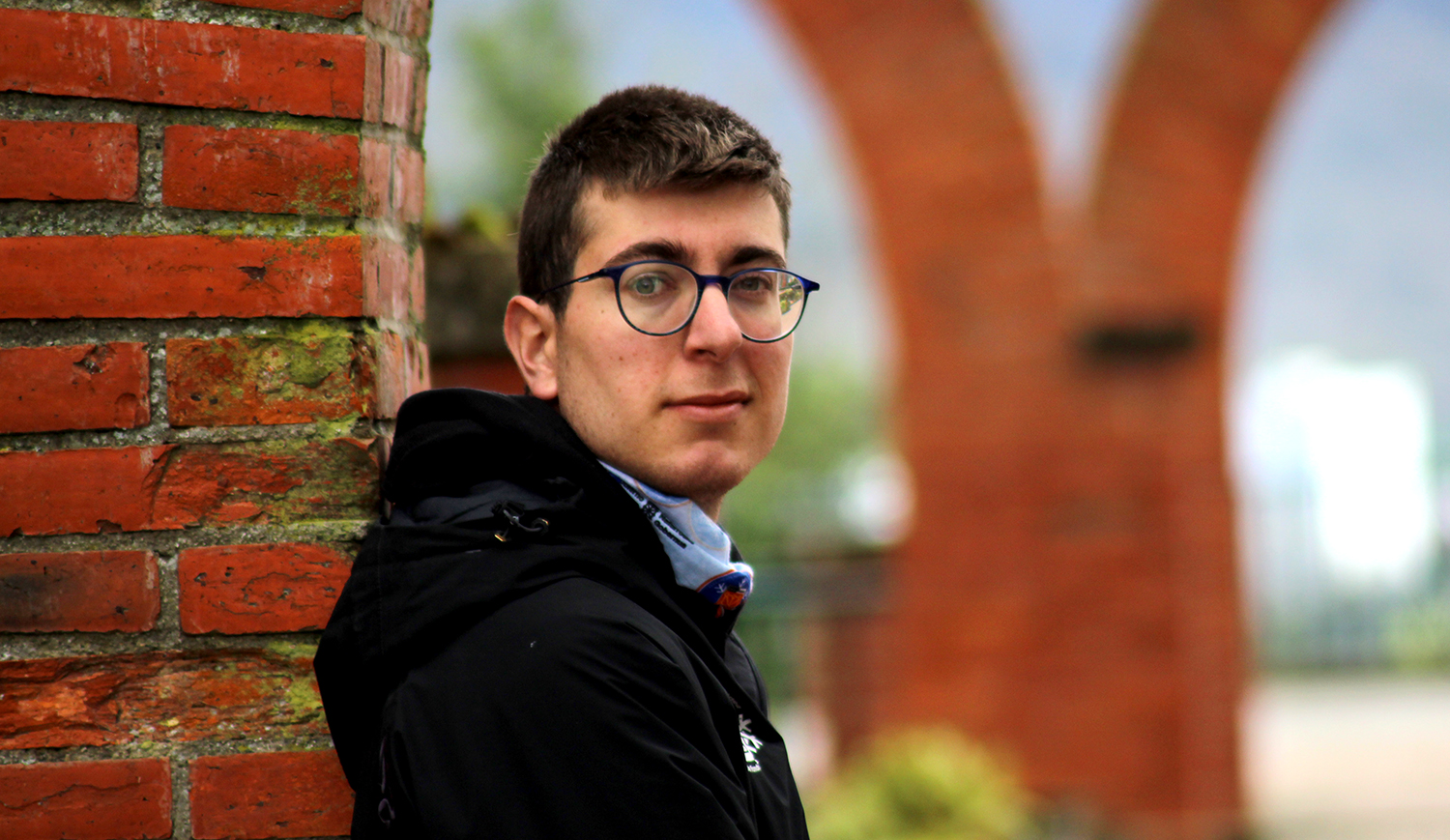"It's not hard to fall asleep when you run for 40 hours."
- Kilian Jornet i Burgada is the best mountain corridor in the world. He spent his childhood at almost 2,000 meters, as his father worked in the shelter of the Cap de Rec (Catalonia). She currently lives in Chamonix, in the French Alps, but it is easier to find her by taking part in a ski race or mountain race. He has won the Skyrunning, the Ultrarunning, the most important championship and cups and has just turned 26, with Summits of my life as his last challenge.
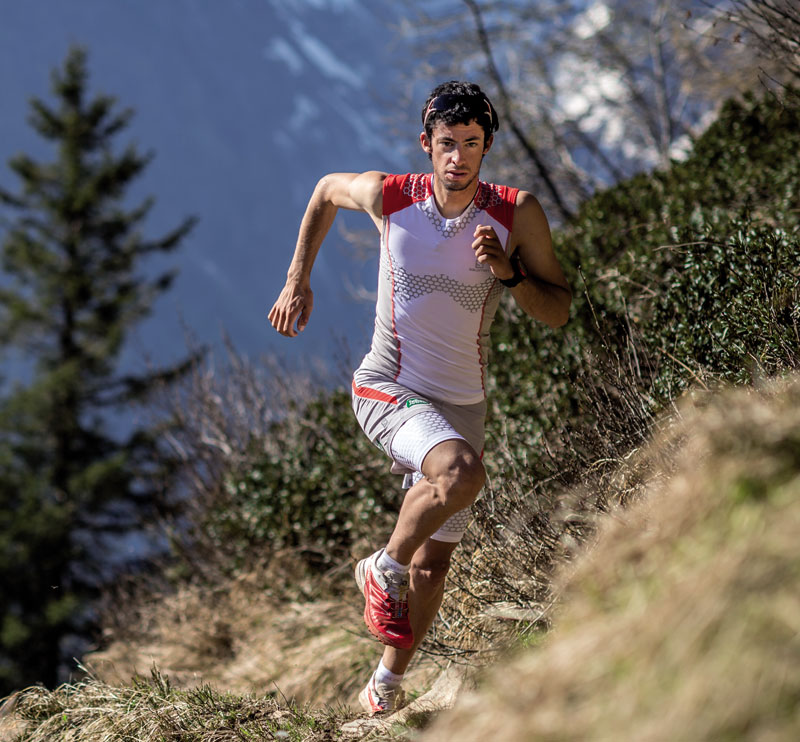
The Catalan who, at 6 years old, raised his first 4,000 and at 10 years old crossed the Pyrenees, proposes a new project, climbing and lowering the highest peaks of all continents at the highest speed so far, bringing as little material as possible: Mont Blanc, Elbrus, Matthernhorn, Akonkagua, McKinley and to end, in 2015, Everest. The sportsman of 1.70 meters and 57 kilos is willing to continue showing that he is the fastest and has no limit whatsoever.
Summits of my life, for example, seeks the closest possible relationship between the human being and the mountain. Can you enjoy nature while doing such tough tests?
Mountains and nature are a very important part of my life, because I've always been surrounded by mountains and I feel better surrounded by them. And yes, during the test you can enjoy nature, although as everything has its pros and cons. The mountain gives you and takes you away, and you have to recognize that to be on the mountain.
Go up and down the tops without help and with as little material as possible. To what extent do you risk your adventures? Should we be afraid of the mountain?
Yes, you have to be afraid and very respectful, what you send up there is the mountain, not us. Fear teaches you where your limits are and how far you can go. That's why it's good to be afraid and listen to what your body and your mountain tell you. Unfortunately, death is very present in these kinds of adventures and has touched us all in some way. The line separating the happiness from the ravine is very fine and we must know what risks we are taking, we must know that on the mountain we can pay for the happiness for the skin.
Indeed, you said that the responsibility lies with yourself. It seems dangerous that some people want to do what you do…
Yes, no matter how prepared the mountain is, it is always dangerous and we must be humble in front of it. We have to realize that we can lose a lot and we have to approach the mountain with that attitude, we have to know our capacities, attend to our body, take into account meteorology... There are many factors that have to be taken into account and I do not believe that people have to imitate what I do, without knowing the consequences that this entails.
But you're a benchmark for many athletes. Does that give you responsibility? What are you trying to get to people?
I try to convey a way of seeing life and the mountain and what it can teach us: humility, effort, courage, friendship, perseverance… I think that the mountain always teaches us something and that every day learning something is the most interesting challenge.
We live in the boom of popular racing, mountain racing and triathlon. Do you think amateur sport has prostituted itself?
No, it is good that there are people who want to go out to the mountain and do sport. I find it very interesting if we respect the environment and also respect each other. The goal of trail running tests is not to overcome the records, but to enjoy doing what you like and being motivated to meet the objectives each one has; if you get it, it doesn’t matter if the first or the last one arrives, it seems to me that it has the same merit.
I have read that your heart is able to keep between four and five hours the rhythm that the heart of a 25-year-old athlete suffers for 4-5 minutes. Are they innate traits or are they a consequence of something worked?
I don't know, I guess it has to do with genetics, but it's also probably influenced by the fact that I've always lived on the mountain, at high altitudes, and that parents have led to walk on the mountain since childhood, that they've never stopped. I would say it's the sum of everything.
In your book (Correr or die, in Catalan) suffering is very present. Is there no real effort without suffering?
Suffering serves me to constantly improve, and that is what strengthens me.
Do you think that today's society is too comfortable and that we set objectives too easy?
As everywhere there is everything, but I do not think it is better or worse to set simple targets. The important thing is to set targets, whatever they may be, and to work towards them.
What is winning?
Enjoy the road, learn something and, if possible, find happiness on the road.
You've won the toughest tests in the world. Once we have achieved everything, what?
Well, I've only done half of the Summits of my life project, so I still have a couple of years to think [smiling].
In the book he says that in a race you came out with a single goal: win. But then another runner (Tarcis) who fell on his face stopped to help him.
The best of trail tests is that it's often a matter of friendship. Winning is important, but I'm more happy to know that I've helped someone. In the end I will remember that in the future, and not having won another victory.
As you run, your struggles are more psychological than physical. Where's the limit?
The result is an exchange of physical and psychic skills. When your legs don’t advance, your head can help you overcome, improve, and move forward. And on the contrary, when the mind tells you that you can't do it anymore, you have to use physical force to get it. Both are essential, legs and head, and if one of the two fails, I can't do anything.
Looks like you're flying down. How do you manage your body so fast?
It's mostly a cognitive exercise, knowing how to associate what you see with the speed of finding answers and solutions, and all of it leading to muscles.
Deep down, you're always looking for excitement…
I'm very rational when it comes to career planning and finding solutions, and very emotional when it comes to running them.
You spend many hours running, isn't it to go crazy? You've fallen asleep while you run!
Yes, it's crazy, but after all, it's my day to day, as others drive the day or pass it in front of the computer. And getting to sleep isn't that hard: if you don't stay to sleep, when you run between 30 and 40 hours, you'll inevitably fall asleep, as you make efforts. Your eyes are closing and, despite the struggle, you cannot oppose it. At that moment there is only one solution: stop for a while and take a nap.
What advice would you give to those who have lost motivation and surrendered?
To fight for what you like. Things are not easy to achieve and what we find hard to achieve is what gives us real pleasure.
Summits of my line. A fine linee project trailer:
Korri egitea
“Zergatik egiten dut korrika? Zergatik sortzen dit menpekotasuna lehiak? Ez dakit, uste dut ez dagoela arrazoirik. Aitzakiatzat esan nezake nekatutakoan endorfinak igotzen sentitu nahi ditudala, lasterketa bat irabazteak edo paisaia ederrak ikusteak sortzen didan emozioa sentitzeko beharra daukadala. Esan nezake eragiten didan ongizateagatik egiten dudala korrika, osasunagatik edo arazoetatik deskonektatu ahal izateko. Haurtzaroan erreprimitutako irrikak ezabatzeko izan liteke edo talde baten partaide izateko, zerbaitetan baliotsu sentitzeko. Agian nire patua segitzeko da edo nire beldurrei ihes egiteko. Beharbada, egungo gure bizimoduan galdu dugun ingurune erromantikoa berreskuratzeko egiten dut, edo nire istorio dramatiko eta heroikoa sortzeko, Erdi Aroko edo gerretako kondairen pare, protagonista eta heroia izanik, epika lortzea gero eta zailagoa dirudien mundu batean. Ez, uste dut gustatzen zaidalako baino ez dudala korri egiten, instant bakoitzaz gozatzen dut eta ez dut zergatian pentsatu beharrik”.
Atleta ona izatea
“Atleta handia da bere gaitasun genetikoak aprobetxatzeaz gain atzetik lan handia egiten duena, baina atleta bikaina da konplexutasunaren eta desordenaren uretan igeri egiteko gauza dena, itxuraz zaila dena erraz eginez, desordenaren barruan ordena ikusiz. Pertsona sortzaileek desordena bilatzen dute, kontzientziaren mugetatik harago irudikatzen dituzten txoko guztiak arakatu ahal izateko, barrutik eta ingurutik darien indar irrazionalei segika”.
Lasterketa
“Lasterketa, artelanaren modukoa da: teknikaz eta lanaz gain, behar bezala burutzeko inspirazioa behar duen sorkuntza da. Eta iragankorra ere bada, sortu bitartean gozatzen duzulako eta une gorenean, bikaintasuna lortu duen puntuan, betirako desagertzen da eta ezinezkoa izango da lasterketa bera berriz sortzea. Antzeko lasterketak egongo dira, antzeko emozioak biziko ditugu eta antzeko sentsazioak sentituko, baina inoiz ez du forma bera izango, inspirazioak beste forma batzuk arakatzera eramango gaituelako”.
Córrer o morir liburutik hartutako pasarteak.
Harri-jasotzearen gorakada nabaritu da azken urteetan, batez ere emakumeen artean. Gazteek harri eskoletan ikasten dute kirolean esperientzia dutenengandik. Crossfit-a, sare sozialak eta telebista faktore garrantzitsuak izan dira kirolaren piztualdian, harri eskolekin batera... [+]
Irungo Landetxa auzoko pala txapelketa mistoan, hogei bikotetik bakarra da emakumeek osatua, 40 lagunetik bi baino ez dira emakumeak: Idoia Karrera eta Loiola Zuazu. Lehiaz, txapelketa misto eta ez mistoen arteko aldeez eta joko-mailaz mintzatu gara haiekin. "Emakumeok... [+]
Lehengai anitzekin papera egitea dute urteroko erronka Tolosako Lanbide Heziketako Ikastetxe Integratuko kimika industrialeko ikasleek: platano azalekin, orburuekin, lastoarekin, iratzearekin nahiz bakero zaharrekin egin dituzte probak azken urteotan. Aurtengoan, pilota... [+]
Historia errepikatzen dela idatzi zuen Marxek, “lehenik tragedia gisa, gero fartsa moduan”. Armagintzaren eta militarismoaren inguruan errepikapen hutsa ez, espiralean goraka doan buklea ari gara bizitzen, fartsatik asko duena, eta tragedian amaitzeko gero eta aukera... [+]
Azken aldian, asteburuetan, Internet ez dabil ondo. Hasieran, zaila zen webguneei ezarritako blokeoen zergatia ulertzea; orain, badakigu Espainiako La Ligak agindu zituela, futbola modu ilegalean emititzea saihesteko. La Ligaren blokeoak euskal domeinuei eragiten dien... [+]
Orain arte desgaituak ez diren pertsonekin lehiatu da Uharteko Ipar Eski Taldeko Eneko Leyun eskiatzailea (Iruñea, 1998). 2024-2025 denboraldian, lehenengo aldiz parte hartu du Adimen Urritasuna duten Pertsonentzako Iraupeneko Eskiko Espainiako Txapelketan. Urrezko... [+]
Euskal Pilotako Nazioarteko Federazioaren eta Espainiako Federazioaren arteko gatazkak bere horretan jarraitzen duen bitartean, Jose Manuel Rodriguez Uribesek euskal selekzioaren aldeko adierazpenak egin ditu. Desadostasunak direla eta, Nazioarteko Pilota Federazioaren eta... [+]
Ertzaintzak martxoaren 13an Bilbon zauritutako bi pertsonaren testigantza jaso ditugu. Athleticen partidaren ostean larriki zauritu zituzten aita-semeak, borra-kolpeka, eta atxilo eraman zuten haietako bat. Furgonetatik ikusi zuen ertzainek nola egin zuten tiro jendearen kontra,... [+]









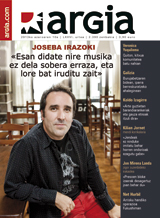




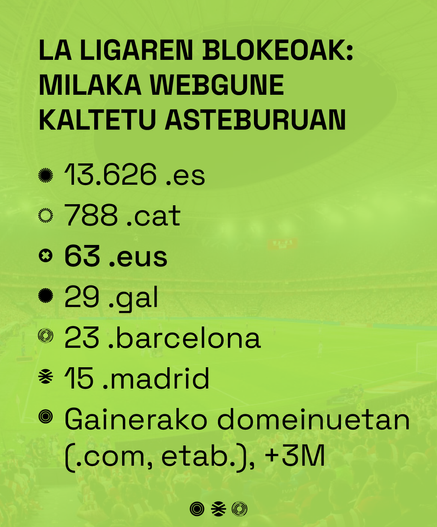



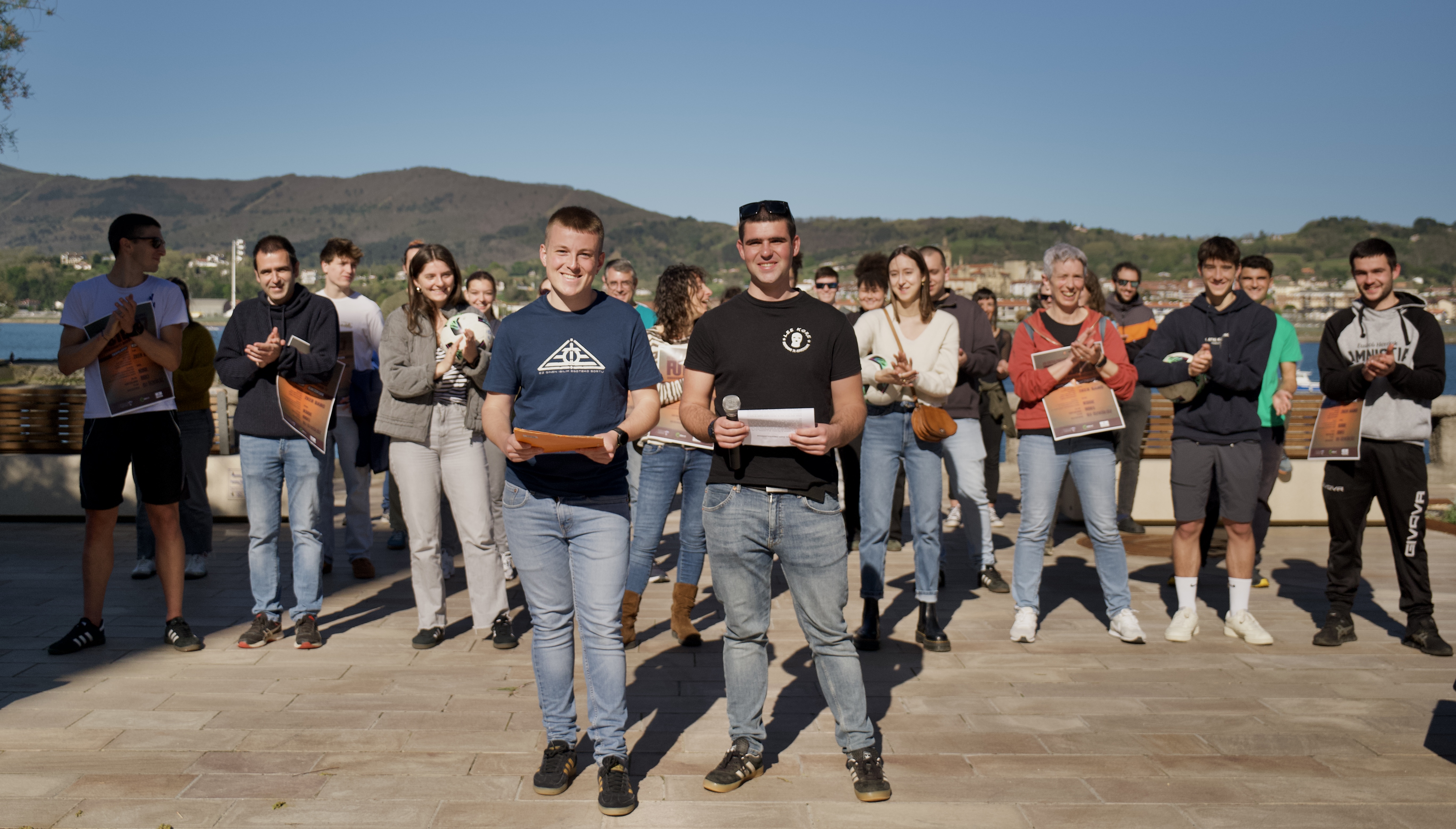

.jpg)

